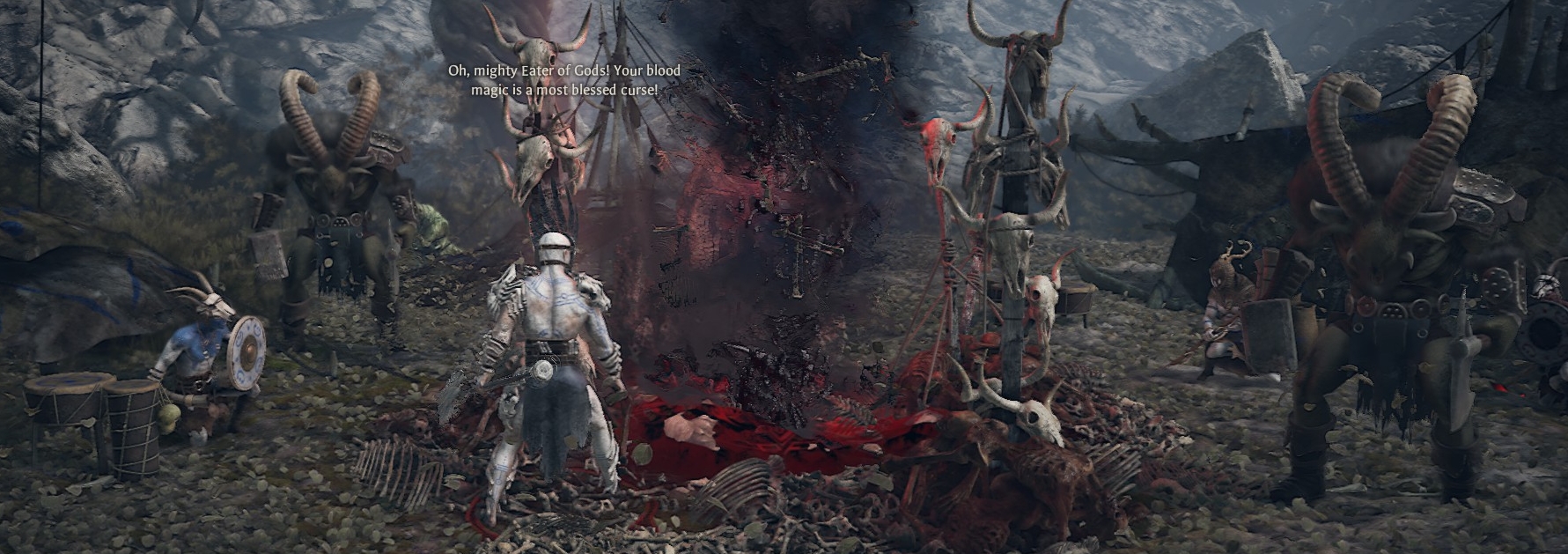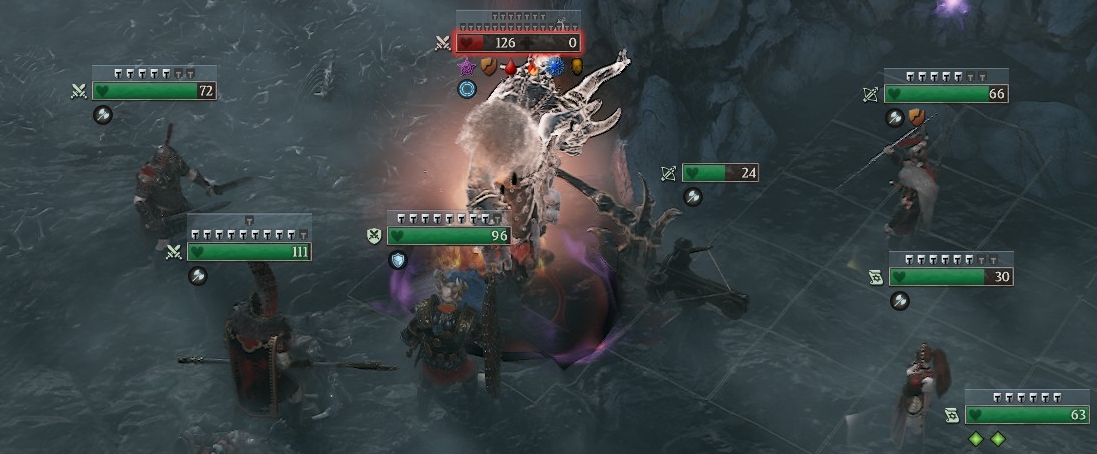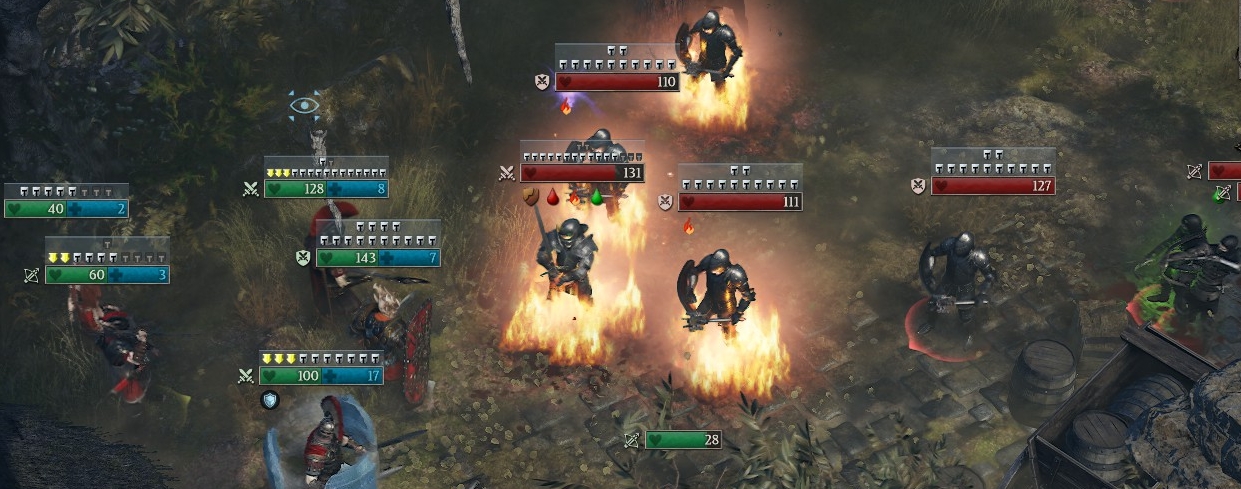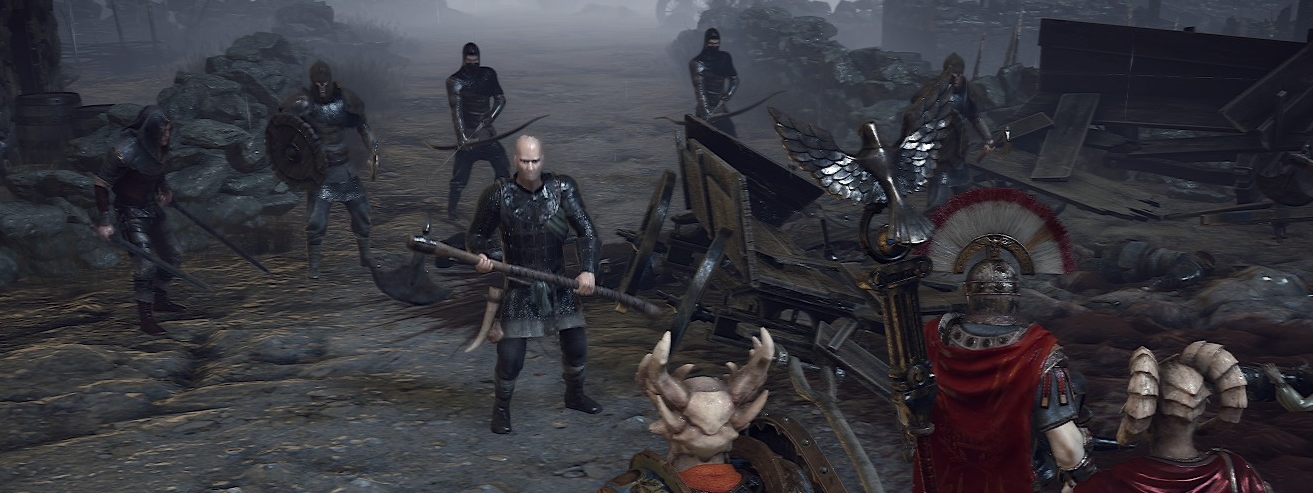It’s time to once again adventure in Avalon. However, this time around we are ditching the knights of the Round Table in favor of a long-lost Roman legion. Seeing as
King Arthur: Legion IX is an expansion for
King Arthur: Knight’s Tale made stand-alone, you will not be getting the same amount of game as the original. That is all fine and dandy considering it being a DLC with a lower price point, but what I didn’t expect going in, was the much more streamlined experience. Many of the cool “Xcom” aspects of
King Arthur: Knight’s Tale have been cut, like for example tending to wounds, building up your colony, and maintaining a team in the form of picking and choosing whom to take on missions.
Pax Romana
In
King Arthur: Legion IX you get to play as Gaius Julius Mento, a commander of the Roman Ninth Legion. You are sent on a mission to find your way out of the underworld of Tartarus. However, in the search, Gaius stumbles upon a portal to Avalon, and from here on out you must find your missing remaining companions and create a new glorious Roman Empire – in the land of King Arthur.

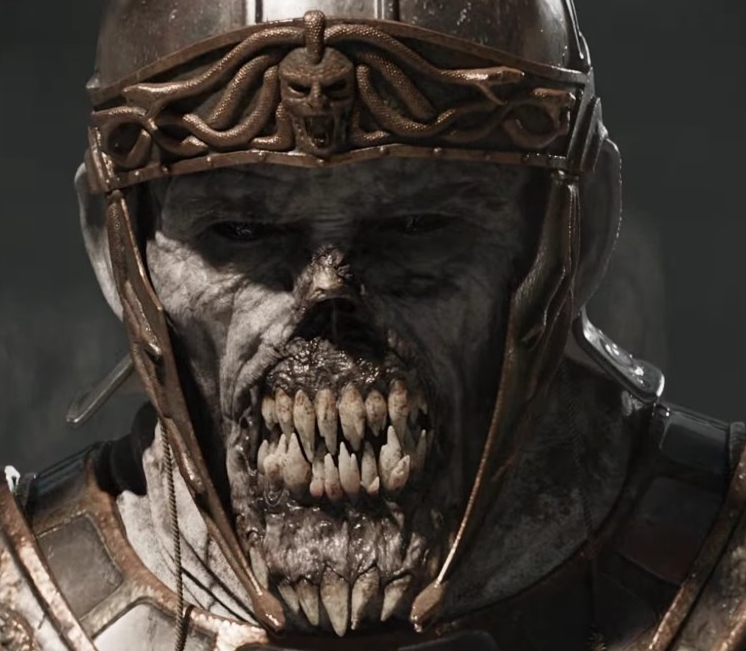
Now, the premise is interesting since there is a link between the Romans, and the British Isles from history, as most of you know. However, being that there are a few centuries between the Arthurian legends and the Western Roman Empire, it does ring a little off, at least to me. The narrative established the why and how fairly well, but I couldn’t help to feel that the Roman faction felt misplaced throughout – like following a WW2 infantry platoon in a tale of a modern USMC unit already told. It might sound nitpicky seeing as this setting is mythological, but the technological aspect in both armor and weapons should be pretty big between the Roman soldiers and Medieval Knights in full plate. This would make the Romans a lot weaker than they come off in the game, and on top of that, now you have Romans roaming the lands of Avalon that they don’t have an affiliation to. The implication is that all myths are linked somehow. Is Hel also connected to this system – are the Vikings next to stumble upon Avalon? Or maybe Arthur will invade Valhalla?
I know all this is not on the same wavelength, as the Arthurian legends were not a belief system. And I probably put too much thought into this since regarding mythology and history, nothing is flawlessly clear. But I just find it a little weird, as in a bit anachronistic for my taste, and how the legends, myths, and history apparently can intersect willy-nilly. The game does not go into any deep dives into how exactly, just that there is a Roman settlement in Avalon, blessed by the lady in the lake and you must restore it.
Beyond my autistic ramble, the story is acceptable, but a little boring concerning the decision-making involving the plot. As I mentioned, everything is streamlined, and so are the narrative choices. You now only have to contemplate the moralistic choices between good and evil. Some of your companions are demonic, and some are reaching for humanity, which means they favor one over another. This of course comes with some significance down the line, so you better choose wisely. However, any gamer worth his salt can see the writing on the wall long before that moment comes into play and pick whatever benefits him or her the most.
Time to testudo
The gameplay doesn’t change much from the original when you consider the tactical gameplay. You will be visiting a lot of different maps where you have to defeat all kinds of enemy types in turn-based combat – many from
King Arthur: Knight’s Tale. You will not be getting too much new to trust your gladius through, except legionnaire traitors, which unsurprisingly look a lot like you. Seeing as this is a minor expansion, and not a grand new sequel, I can’t fault them here. We also have to reflect upon that the world is the same, namely the good old island of Avalon. So, it probably wouldn’t make much sense to introduce too many new kinds of horrors. Expect a lot of units you have seen before.
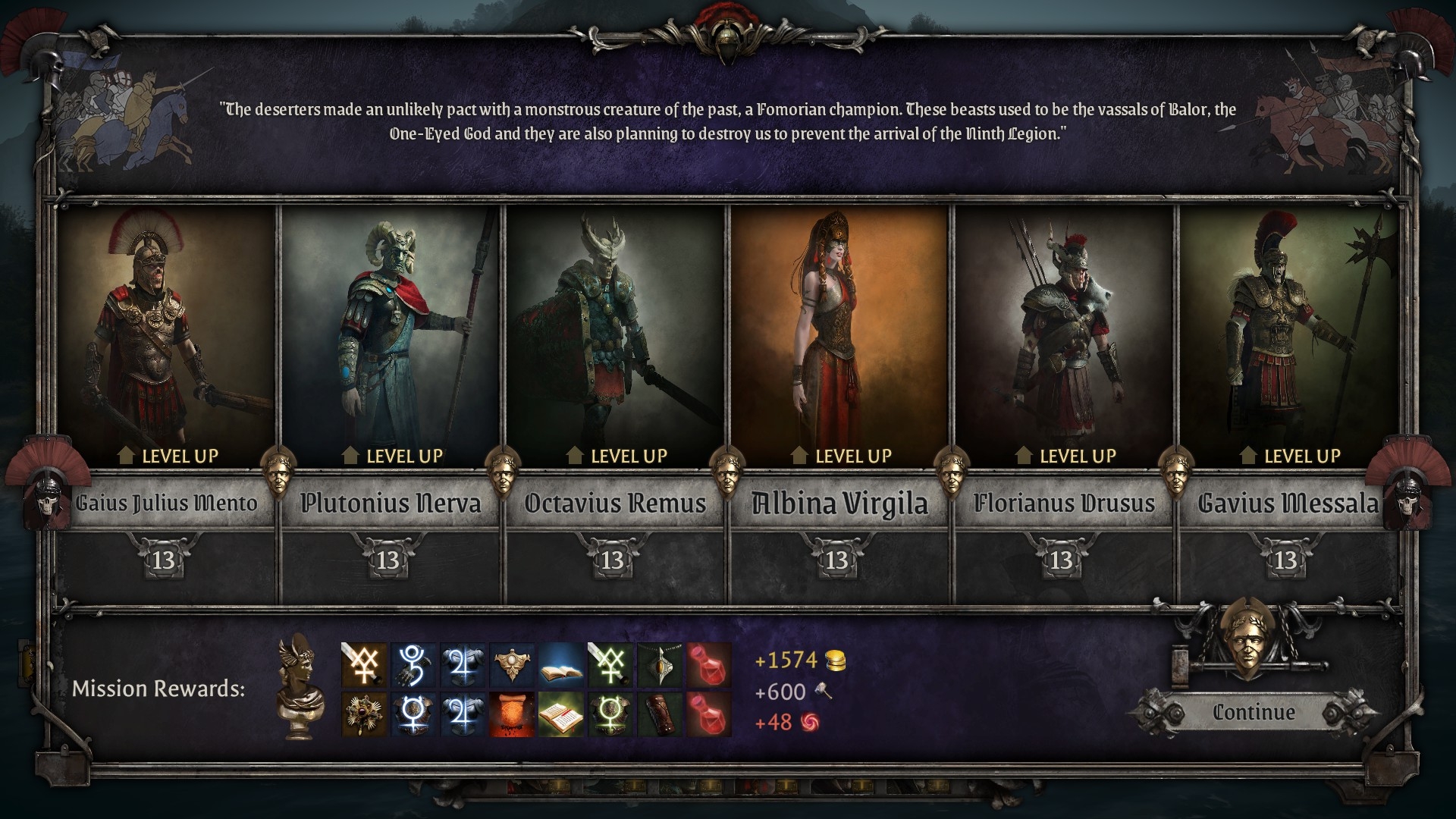
However, where this expansion makes major changes is to the management. The game explains that wounds and deaths aren’t a problem anymore by making the faction you control undead. That’s fine from a narrative sense, but it makes the gameplay weaker since you will never have to consider who to take on missions, and who to rest for that big upcoming boss fight. Who cares if someone dies when they will resurrect with no issues at all after a battle? No carefulness is required! The companions you can pick from are also limited to one team, which I assume was also a factor in the removal of wounds so as not to trap the players in the middle of the campaign.
By having so few soldiers in your roster, you might think the companions will have a larger portion in the story, but sadly, that’s not the case. There is very little presented here beyond what the two main comrades in your little crew will say, and the reason they have anything to say at all is that these two represent the two opposing ideals. It’s disappointing because the management was one of the most enjoyable parts of
King Arthur: Knight’s Tale. This feature has been streamlined to picking gear and talents, which makes the combat and the character-building of your murder gang the only thing that remains. There is the addition of activating bonuses (that come with negatives) for the combat scenarios, but it was a feature I only used once. However, I do see the potential if you are a true autistic character-builder since this can elevate any party if you plan it right. The reason I didn’t explore this option much is that I just don’t like having permanent debuffs on my team, even if the bonuses looked enticing.
The endgame
Despite all my endless complaining, the gameplay loop is still enjoyable for what it is. The narrative drove me forward, as I wanted to know what would happen to Gaius and his tooth-decayed friends. The combat was challenging enough, however, near the end, I apparently built my gang of Roman marauders so well that the enemy couldn’t touch me at all regardless of how much they tried to poke my eyes out. Where
King Arthur: Legion IX shines is the beginning and the middle, and if you don’t screw up the talent trees of your men you will become gods of bloodletting. What threw me for a loop though, was that the main event of the game ends before the story is tied together. The central bad guy remains, but you see – this is where the so-called endgame starts. The problem here is that the story takes a nose dive for endless sidequests with no narrative at all except killing mooks forever and ever. After a couple of missions, I started to wonder if this was some kind of meta-narrative about hell because it truly felt like I was trapped in a permanent state of motion to be repeated forever as punishment for my sins.
It was so boring that I had to quit before I could see it to the end. Yet, according to the game, I did manage to finish it since I got an achievement for completing it. I’m a bit confused about what this is supposed to be because it feels very undercooked story-wise. I guess, it’s just something extra for the true enjoyers, but then again… it leaves everything else lacking with a feeling of the story being unresolved unless you press through this unsatisfactory part.
Looks the same
The graphic quality is the same as in
King Arthur: Knight’s Tale with the new Roman models looking the part. However, I did find it odd how you and your companion’s bodies look all rotten in the scene transition art, but the rot is only represented on the faces of the game models. At times, the arms, legs, and hands all look normal and human. Seeing how demonic and decayed the faces are, I expected the limbs to appear in the same grotesque way visually. Maybe the zombie/demonic curse only affects the face – who knows? Another issue that remains from the original is how everything feels “dreamlike”, with a lot of tracing when units move around. It is also blurry, with no setting making it more crisp. Other than that,
King Arthur: Legion IX looks fine.
Music and voice are passable, yet, there is a clear decline in quality when it comes to the voice acting. The only real memorable aspect of the voices is the intro where Gaius Julius Mento comes off as an ancient lich in both tone and way of speech. Very cool. Sadly, this is dropped rather quickly. I should also mention that lines feel off when the game tries to be funny. I blame this more on the writing than the actual voice work. It’s very jokey at times when the situation is supposed to be dark and brooding. These lines also seem to be a little too modern for the setting.
In conclusion
King Arthur: Legion IX is a weird beast. It’s more of the same, which is expected, but it’s lacking in mechanics and story since it streamlined so much. This could be excused as it’s an expansion, but what makes the title an oddity is that it’s a stand-alone game for some reason. As said, it comes with a lower price, but if you have not played
King Arthur: Knight’s Tale there is absolutely no reason for you to get this over the original, especially when it currently costs the same (the sale lasts until the 23third of May). You will just be getting a lesser product in every way. And for someone like me that have played the original, it’s just disappointing because, for the most part, it removes instead of adding features. So, as a stand-alone game, who is it for? As a DLC for the main game, this would just be seen as something extra, even if the same complaints remain. Now, I’m confused instead. Why not make a full-blooded sequel?
Do I recommend the game? It was not all entirely bad, however, I would only recommend a purchase if you really enjoy the combat portion and desperately want more. For someone new to the series, get the original game instead. It’s much better, and you get more game for your buck with a superior story that is consistent with the theme of the setting.
Thanks for reading.




















